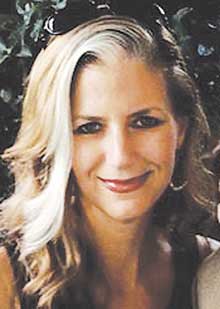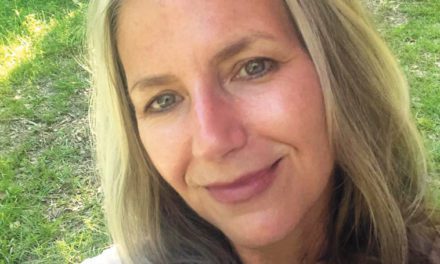
“Okay, Mom is screaming ‘tourist’ right now… Screaming…”
This from my suddenly-so-sophisticated, black-clad teenager as she walked a few paces behind her father and me down a steep sidewalk in San Francisco last week.
She had a point. In my bright turquoise Patagonia rain jacket, I was the only one in that city of almost a million not wearing black, gray or brown on that drizzly day. (Or anyday, as far as I can tell.) My comfy running shoes stood out in a sea of chic boots, and my jeans should have been leggings. I might as well have been wearing a sign on my back that read “Southern Suburbanite.”
I sighed, then laughed it off. I learned a long time ago that I can’t avoid this fate when in the Big City. No matter what I wear, it’s always wrong, and even if it weren’t, at some point I’d smile at some strangers passing by, open my mouth, and say “Hey, y’all.” It’s what I do. I can’t help it.
This drives my West Coast-born, city-boy husband bonkers. Even though he’s been living in the Lowcountry for over 20 years now, and is comfortable with Southern cordiality – as long as it stays in the South – he’s embarrassed and annoyed when I take that show on the road. When we’re traveling, he doesn’t like the way I strike up cheerful conversations with waiters, store clerks, and random folks at bus stops. Once, while we were walking down a street in Manhattan, he told me if I didn’t stop smiling and saying “hey” to passersby, people would think me crazy… possibly even dangerous. He said I might get myself hurt.
But that’s New York, right? Fair or not, New Yorkers have a reputation for being brash and no-nonsense. But what’s up with San Francisco? As much as I love that beautiful city, I never quite feel like it loves me back. No matter how often I visit – and since it’s my husband’s hometown, that’s fairly often – I’m always thrown by the way people pass each other on the street so brusquely, without greeting or even acknowledgment. People don’t make eye contact. Exchanges are terse. The city prides itself on its humanitarianism and its great well of tolerance – those values are proclaimed from signs and posters and tee-shirts all over town – but to me, it always feels like everybody’s a little ticked off. There’s a low-grade hostility in the air.
Maybe it just feels that way to outsiders? Or maybe just to certain outsiders? Maybe San Franciscans take one look at me – and hear my “hey, y’all” – and recognize me as one of those people… the ones who are forever mucking up that utopia they envision just beyond the horizon. A Southerner.
While I may scream ‘tourist,’ I’m pretty sure I bellow ‘Southerner.’ When I was young, this unshakeable brand embarrassed me. But as I grow older – and the world at large grows more hostile toward the South – I feel compelled to embrace my Southernness. I’m ornery like that. Imperfect as it may be, the South is my family. And while I can criticize my family ‘til the cows come home, I bristle when outsiders do it. Besides, despite what you hear on the news – especially during election season – the South is a pretty wonderful place. This becomes glaringly apparent when you travel beyond it.
“I have noticed that the South changes people,” the late, great Pat Conroy told me in an interviewa couple of years ago, after publishing his memoir The Death of Santini. We were discussing his infamous father and the rather amazing, late-life metamorphosis of Col. Donald “Santini” Conroy.
“No matter when they get here, it changes them,” Pat said. “I saw Fripp Island retirees get friendlier the longer they lived there. They got comfortable; they loosened up. I think that happened to my father. Dad became an extraordinarily charming man later in life, and I think living in the South had something to do with it.”
In a cynical world that often frowns on “nice” – and looks upon it with suspicion – Pat Conroy valued that quality enormously. I can’t count the times over the years I heard him sing the praises of “nice.” Considering his harsh childhood, I honestly believe “nice” was a big part of Beaufort’s appeal for Conroy – one of the reasons he adopted this place as his hometown at age 15, and kept coming back here, even as he traveled the world. As a child, he didn’t get much “nice,” and he craved it until his dying day.
But what of the common accusation that Southerners only seem nice? That every “bless your heart” is a thinly veiled “go to hell”? Well, I suppose there’s a grain of truth in that. Sometimes, anyway. (But not always.) While the rest of the country steadfastly touts honesty as the best policy, demanding full disclosure in each and every situation, in the South our mamas still teach us, “If you can’t say anything nice, don’t say anything at all.” So, there’s a lot we don’t say down South. Not to your face, anyway.
I found myself in a funny conversation with my California cousins last week. Can’t remember how it started, exactly, but it ended with me saying something like, “In the South, we talk about you behind your back. That way, you don’t get your feelings hurt.” My cousins laughed. They thought I was kidding.
When I was younger and fancied myself much smarter than I now know myself to be, I frowned upon this Southern tendency to value politeness and decorum over brutal honesty. I came to believe the blunt and confrontational were morally superior to the genteel and considerate. But I’ve lived long enough now – and have known enough folks from outside the South – to know that just because somebody “says it to your face” doesn’t mean they’re not “saying it behind your back,” too. If people are going to make mean, petty remarks about me – and in this life, alas, I fear that’s a given – I actually prefer they do it behind my back. What I don’t know won’t hurt me.
Who was it that said, “What other people think of you is none of your business”? Whoever it was, I fully endorse that sentiment. If you don’t like me, just smile and pretend you do, and we’ll get along just fine.
You may call this “fake nice.” I just call it “nice.” Here in the South, we’ve always known a bit of pretense is humane . . . even necessary. It greases the wheels of society and helps things flow along. Like people all over the world, we Southerners feel cranky and critical, irritated and angry, disillusioned and disappointed often enough. Unlike people all over the world, however, we don’t wear those feelings like a badge of honor or believe much good comes from expressing them every dang time they arise.
We don’t believe in airing our dirty laundry, either. Remember when Bill Clinton lied about his affair with Monica Lewinsky? All my most enlightened friends – some from outside the South, some who just wish they were – proudly declared they couldn’t care less about Clinton’s sex life; they just couldn’t abide the fact that he’d lied about it. In my conflicted Southern heart, I couldn’t help thinking that lie Clinton told was the only part of the whole sordid scenario that smacked of human decency.
Southerners know a bit of public hypocrisy is necessary if civilization is to survive. It’s the only way fallen creatures can uphold important ideals. We prefer to confess our sins in private.
In the South, like everywhere else, we break a lot of commandments, but we take the Biblical injunction to “love thy neighbor” very seriously. We know you don’t have to “like” somebody in order to love them. Love, after all, is an action, not a feeling. Sometimes, love is just making the effort to be nice, even though you don’t feel like it.
I was thinking about all this as my family and I walked the trail to Yosemite Falls last week, on the second leg of our Spring Break trip. I was happy to be out of the city, with its push and shove, its black and gray, its arch hipness and misanthropic humanitarians. But even here in Yosemite, in the awesome shadow of soaring granite, beside ancient Sequoias, beneath an azure sky – where robin redbreasts and stellar jays drew near enough that I could hear their beating wings – the people passed us on the path with eyes cast down or straight ahead. No smiles. No nods. I ached to connect with these people, my fellow pilgrims. I would have laid a “hey, y’all” on ‘em, but that didn’t seem quite right in this hallowed spot. “Namaste” or “peace be with you” might have worked. But, again, no eye contact. No invitation to friendship. I kept my mouth shut and forged ahead.
There would be time enough to share stories of this transcendent place once I got back home. Home to the South.





